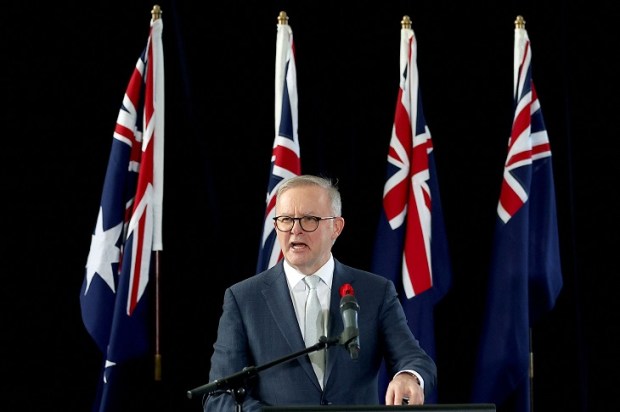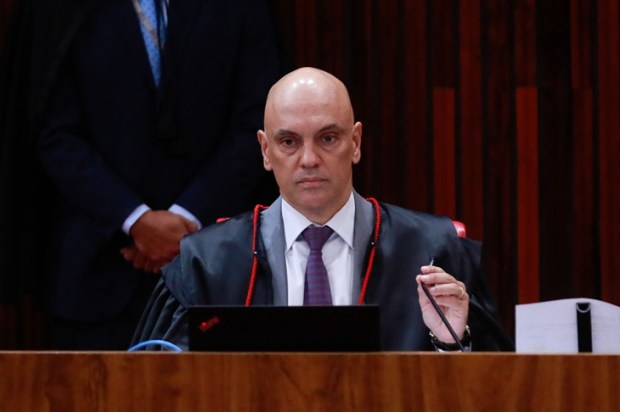The end of the year could be the swansong for free speech in Australia. The Misinformation and Disinformation Bill, passed in the House of Representatives on November 7, has been submitted to the Senate for final review. If it passes there, digital media will be required to censor itself, thus cancelling all speech which is deemed to constitute misinformation or disinformation.
Free speech implies one’s ability to express opinions without fear of reprisal. The right to free speech constitutes a mechanism to avoid the concentration of power in the hands of the ruling elites. These elites may aspire to suppress any speech that could be construed as a threat to their hegemonic power.
Independent senators David Pocock, Jacqui Lambie, Tammy Tyrrell, Fatima Payman, and Gerard Rennick appear to have voiced their opposition to the bill, thereby securing its defeat even if Labor gains support from the Greens, which is likely. Although the Opposition has vouched to vote against the proposed legislation, it plays an unsavoury role. While it opposes the proposed law, it is nevertheless supporting government attempts to ensure that teenagers, under the age of 16, do not have access to the digital media. It is like a two-headed bicephalic monster that is incapable of truly understanding the role that free speech plays in maintaining a democratic form of government.
To exercise their sovereign power, Australians must be free to communicate about government and political matters, fully and frankly. In fact, no Australian Parliament should be constitutionally allowed to introduce legislation that prevents the sovereign people of Australia from freely expressing their political views, as this is just not compatible with representative government. Representative government, as noted in Nationwide News v Wills (1992) is a ‘constitutional imperative’. It is intended ‘to make the legislature and executive branches of the Commonwealth ultimately answerable to the Australian people’.
If anything, a sovereign people must be free to speak the unspeakable, especially about social and political matters. It borders on absurdity to assert that elected representatives of the people may speak outrageously; but the people in whom sovereignty resides, and from whom Parliament, MPs, and the executive derive their authority, cannot speak freely.
The Australian Capital Television case, in 1992, referred to ‘a free society governed in accordance with the principles of representative parliamentary democracy’ as entailing ‘freedom of movement, freedom of association and … freedom of speech generally’. Similarly, in Attorney-General (SA) v Corporation of the City of Adelaide, in 2013, it was stated:
‘Freedom of speech is a long-established common law freedom … linked to the proper functioning of representative democracies and on that basis has informed the application of public interest considerations to claimed restraints upon publication of information.’
Unfortunately, in our present political environment, censorship is rampant. Some Australians have found themselves at the receiving end of expensive litigation when they dared to stand by moral values that are no longer accepted by the ruling classes. Although the top-judges in Australia have acknowledged an implied constitutional freedom of ‘political communication’, especially in the landmark cases of Nationwide News v Wills and Australian Capital Television Pty Ltd v The Commonwealth(1992), freedom of speech remains considerably unprotected insofar as the systematic suppression of dissenting political voices is concerned.
A good example of this trend is the sponsoring by the Albanese Labor government of this proposed law that, if it passes the Senate, will curtail freedom of speech in Australia. Specifically, the Communications Legislation Amendment (Combating Misinformation and Disinformation) Bill 2024 foreshadows the imposition of an obligation on digital platforms to police ‘misinformation’ and ‘disinformation’. This imposition involves a two-pronged approach: the digital platforms are expected to adopt a code of conduct, violation of which will see them censor speech deemed to constitute ‘misinformation’ or ‘disinformation’. If that does not work, the bill provides for the empowerment of the Australian Communications and Media Authority (ACMA) to directly intervene for the purpose of preventing ‘harm’.
Section 14 of the bill defines ‘harm’ as follows:
For the purposes of this Schedule, serious harm is:
(a) harm to the operation or integrity of a Commonwealth, State, Territory or local government electoral or referendum process; or
(b) harm to public health in Australia, including to the efficacy of preventative health measures in Australia; or
(c) vilification of a group in Australian society distinguished by race, religion, sex, sexual orientation, gender identity, intersex status, disability, nationality or national or ethnic origin, or vilification of an individual because of a belief that the individual is a member of such a group; or
(d) intentionally inflicted physical injury to an individual in Australia; or
(e) imminent:
(i) damage to critical infrastructure; or
(ii) disruption of emergency services;
in Australia; or
(f) imminent harm to the Australian economy, including harm to public confidence in the banking system or financial markets;
that has:
(g) significant and far-reaching consequences for the Australian community or a segment of the Australian community; or
(h) severe consequences for an individual in Australia.
In other words, the concept of ‘harm’ is a flexible and accordion-like concept that potentially encompasses any type of speech which ACMA deems to be ‘harmful’. As such, the concept has a malleable content that expands and contracts depending on ACMA’s prevailing views. ACMA’s enforcement of the legislation will inevitably stymie discussion of controversial topics, especially if they involve criticism of government policy and actions.
The proposed legislation is a direct attack on the rights of Australians to free speech because digital platforms will be obliged to police commentators’ discussion of controversial topics. Predictably, this scenario is likely to unfold when the impugned speech is incompatible with the government’s narrative. Thus, the proposed legislation targets those who, merely exercising their right to free speech, critically assess government decisions and actions.
If the legislation had been in place prior to the Voice referendum, it could have been used to silence any opposition to the enshrinement of the Voice in the Constitution. It could also have been relied upon to restrict any criticism of the government’s handling of the Covid pandemic and, in the future, it would almost certainly be used to silence critics of the government’s Net Zero transmissions fantasy.
The legislation thus aims at regulating and controlling the operation of digital platforms, such as X (formerly Twitter), Meta, and others by requiring them to remove any ‘offending’ information which Australians may want to post to these platforms. Such enforcement itself is likely to generate harm because the banishment of views from the public forum will adversely affect and diminish people’s free speech rights.
In this context, it is interesting to note that the government, in regulating the behaviour of the social media, discloses its distrust of these media, but it does somehow trust them for the purposes of enforcing its proposed legislation. Importantly, the legislation would effectively drive dissenting views underground.
It is ironic that views incompatible with the government’s preferred narrative could be deemed to ‘harm’ the integrity of Australia’s electoral or referendum process since it would disallow speech and expressive conduct that is integral to the maintenance of democratic processes. Indeed, a healthy democracy is always dependent on the free flow of ideas, even if a government agency describes them as ‘misinformation’ or ‘disinformation’.
The proposed law thus threatens the communications and livelihoods of human rights defenders and investigate journalists.
The relentless promotion of Covid vaccines and the imposition of vaccine mandates provide excellent examples of the silencing of free speech during the pandemic when Australian governments, assisted by their ‘health experts’, flirted with authoritarianism. Many Australians are now discovering that the vaccine mandates were illegal, and that the oppressive measures, such as prolonged lockdowns and suspension of human rights to freedom of religion, freedom of speech, and freedom to associate were neither necessary nor beneficial.
At the beginning of the vaccination rollout, the Australian government collaborated with social media platforms to censor anyone who dared to question the safety of vaccines, including doctors who disagreed with official health information. The ‘muzzling’ of doctors’ free speech constituted an egregious attack on medical speech.
Freedom of information documents acquired by Senator Alex Antic reveals that from 2017-22, the Australian Department of Home Affairs petitioned social media sites to censor information 13,646 times. This included ‘suppressed Covid posts from doctors who disagreed with official public health and vaccine information’. The information reveals ‘an Australian Government department as a key player in the Covid censorship industrial complex’ and, to that purpose, it directed social platforms to censor free speech.
The concept of ‘harm’, peddled by the bill, is an illusory concept, the content of which would be subjectively determined by a powerful government agency. Although ACMA will likely develop guidelines for the purpose of clarifying the concept, they may well reflect the left-wing bias of the world in which we live. It is a world where government, increasingly, seeks to wield power over the individual. In this context, it is useful to remember the words of John Stuart Mill, the 19th Century philosopher and politician, who wrote in his celebrated essay On Liberty:
… there is also in the world at large an increasing inclination to stretch unduly the powers of society over the individual, both by the force of opinion and even by that of legislation; and as the tendency of all the changes taking place in the world is to strengthen society, and diminish the power of the individual, this encroachment is not one of the evils which tend spontaneously to disappear, but, on the contrary, to grow more and more formidable. The disposition of mankind, whether as rulers or as fellow-citizens, to impose their own opinions and inclinations as a rule of conduct on others, is so energetically supported by some of the best and by some of the worst feelings incident to human nature, that it is hardly ever kept under restraint … and as the power is not declining, but growing, unless a strong barrier of moral conviction can be raised against the mischief, we must expect, in the present circumstances of the world, to see it increase.
John Stuart Mill’s analysis also aptly describes the present dystopian world. He derides the sheep-like conformity, which enables rulers, policymakers, and trendsetters to impose their freedom-unfriendly views and arbitrary rules on people. He stresses the overriding importance of free speech: ‘The only freedom which deserves the name, is that of pursuing our own good in our own way, so long as we do not attempt to deprive others of theirs, or impede their efforts to obtain it.’ Mill signals that it is imprudent to allow a government agency to decide what is harmful, especially if it is allocated a wide, uncontrolled power capable of silencing any dissent in society.
In any event, it could be argued that even ‘misinformation’ and ‘disinformation’ are healthy for society because they might encourage vigorous debate to rectify that information. And yet, if the proposed ‘misinformation’ and ‘disinformation’ legislation is adopted and the free expression of ideas is curtailed, these ideas are likely to go underground where they will fester and infect, only to explode when society has become so brittle that any robustness cannot develop. A robust society is one where ideas of all kinds, even obnoxious ones, can be debated with impunity in the public arena.
Of course, the proposed legislation only deals with digital platforms, a concept that, however, is very widely defined in the legislation. For the time being, it will still be possible, presumably, to write and publish a book and opinion pieces, but it may no longer be possible to post them to digital platforms. However, knowledge of history, confirmed by experience, tells us that once a government embraces censorship, it is on a slippery slope that eventually ends up in the abolition or serious curtailment of free speech. The conclusion is that freedom of speech is under threat in Australia, and it behoves on all those who value freedom to oppose this spectacular power grab by the government to control the speech of individuals.
Above all, the proposed ‘misinformation’ legislation undermines the implied freedom of political communication derived from the Australian Constitution. The text and structure of the Constitution, and particularly its system of democratic government, gives rise to an implication that there must be the freedom for citizens to discuss any political matter. By taking away people’s freedom of political communication, the Misinformation and Disinformation Bill is constitutionally invalid, and Australians must demand that their politicians reject such an appalling law proposal.
It is to be hoped that the proposed legislation is rejected by the Senate. It would be a fitting Christmas present to the people of Australia, and a victory for common sense.
Gabriël A. Moens AM is an emeritus professor of law at the University of Queensland and served as pro vice-chancellor and dean at Murdoch University.
Augusto Zimmermann is a professor of law and served as associate dean at Murdoch University. He is also a former commissioner with the Law Reform Commission of Western Australia.
Zimmermann & Moens are the authors of The Unlucky Country (Locke Press, 2024).

























